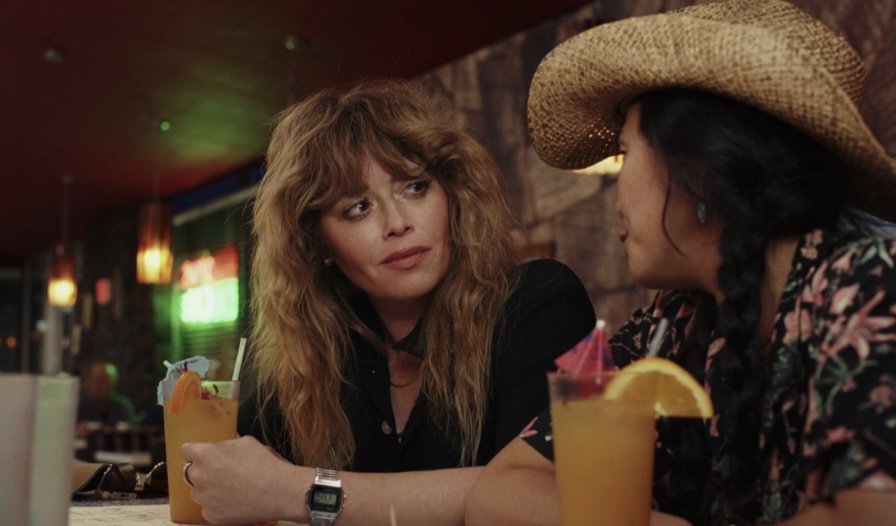My dad liked company on the couch while he watched his favorite television shows, so at a very early age I was watching Kojak, The Rockford Files, and, if we were lucky, Columbo. In fact, my dad got in trouble with my first grade teacher, Miss Roberts, when she found out the reason I was falling asleep on my school desk was because I was staying up until 11 p.m. to watch these rather-inappropriate-for-a-six-year-old TV shows with my father. Naturally, he charmed his way out of the doghouse, and he and Miss Roberts ended up becoming friends.
The point of this story is that those wonderful ’70s procedurals—with their charismatic, ironical lead actors, and their brilliant guest stars and masterful writing and direction—bathe me in a warm, nostalgic glow. And as I viewed the first six episodes of Poker Face(streaming on Peacock), I experienced the same feelings of delight and enchantment.
I am certainly not the first to say how much Poker Face reminds me of Columbo. Both shows spend the first third of their episodes without their leads, showing the audience exactly who the murderer is and how they did it; a “howcatchem” rather than a “whodunit.” When Peter Falk, as the titular lead of Columbo, and Natasha Lyonne, as Charlie Cale in Poker Face, finally do appear, they are disheveled and distracted, lulling the suspects into a false sense of complacency. All the criminals think they’re different and special and can outsmart Columbo and Charlie, but their hubris is always their fatal flaw. And it’s a pleasure to watch the clever cat-and-mouse game play out every time.
Also similar to ’70s procedurals is the stellar quality of Poker Face’s guest stars: Adrian Brody, Benjamin Bratt, Judith Light, S. Epatha Merkerson, Ellen Barkin, Tim Blake Nelson, Tim Meadows and Chloé Sevigny, just to name a few. I made sure I knew nothing about each episode before I saw them, so I let out a joyful, surprised yelp as these actors popped up on screen, each one doing a spectacular star turn. Even though Natasha Lyonne is both the star and one of the producers (along with creator, Rian Johnson), she is magnanimous about letting her guest stars shine in their own right. Her chemistry with them, as well as with the wonderful lesser-known actors who populate each episode, is authentic and dazzling.
Even the graphics in the beginning credits and the jangly theme music for Poker Face are evocative of ’70s murder-of-the-week shows. As is the direction. The choice to let the action in the beginning of the episodes take its time to play out in long shots, with a relaxed pace, gives the audience a chance to savor the ambience, the setting and the subtle shift in various characters’ thoughts. This is particularly true in the appropriately titled episode, “The Stall.”
The premiere episode (“Dead Man’s Hand”) establishes why Charlie is on the run, and why in each subsequent episode Charlie takes low-level jobs in various small, lonely towns across America. Aside from the same pursuer trailing Charlie, so far each episode is a discrete story unto itself, and the audience could watch them in any order. Unlike virtually every other modern series, character development isn’t as important as the plot. Even though Charlie is the star, she is often not the focal point. In “Exit Stage Death,” she isn’t even the person who solves the murder. Poker Face is less about its lead, and more about the weirdos she meets along the way.
Which is not to say that Charlie is a nondescript wallflower. Natasha Lyonne crafts a unique, strong-willed, brave, and indelible character. Unlike Lieutenant Columbo, Charlie has no power. She has no authority and no weapons to protect herself other than her preternatural ability to know when people are lying. Also unlike Columbo, she has no artifice. She’s not pretending to be messy and discombobulated, she just is. She drinks too much, she smokes, she’s flustered, she’s a misfit. She’s friendly but doesn’t stick around anywhere long enough to make friends. She calls the murderers on their lies as soon as she hears them, and spends the rest of the episode doggedly determined to make sure the criminals are brought to justice. There is no, “Oh, just one more thing…” turnaround. With Charlie, as soon as she hears the killers lying, she blurts out, “BULLSHIT!” Which puts her in significantly more danger than Columbo, as many of the murderers then want to get rid of Charlie, as well. If Charlie weren’t such a decent person, she’d mind her own business and ignore the injustice of relative strangers dropping like flies around her. Then she’d only have to worry about one person, Cliff LeGrand (Benjamin Bratt), a hired assassin tracking her down and trying to kill her. No biggie.
Another pleasure of Poker Face is its lightness of spirit. Other than her life being in constant peril, Charlie Cale is not an unhappy person. She has no money, but she has style and moxie. Despite the hard knocks fate has thrown her way, she maintains an indomitable sense of humor and has an ironic, adaptable, and unexpectedly upbeat perspective. She seems to enjoy her life and her adventures meeting other eccentrics while she criss-crosses the country. Which feels like an enormous relief when seemingly every other TV show is about its protagonists’ relentless, heavy Sturm und Drang.
The writing is clever, funny, and always surprising. Every time I think I know where the plot or a new character is heading, I am almost always wrong. I have laughed out loud, watching all by myself, several times. If you’ve seen the episode with the MAGA dog, you know what I mean. The highly saturated colors in its cinematography add literal and figurative brightness to the show.
There is plenty of darkness in Poker Face. I mean, it’s a show about murder, after all. But there is also the sheer delight of watching superlative, beloved actors as various ne’er-do-wells strut their stuff with finesse in their guest-starring roles. Judith Light and Adrian Brody, for example, are absolute wonders.
Poker Face is both lighthearted and complex. The right balance of sun and shadow: enough to make you think, but not enough to drag you down. And I now look forward to Thursdays—when Peacock releases new episodes—the same way I looked forward to watching those ’70s murder-of-the-week shows with my dad as appointment TV those many years ago. God, I’m old.




